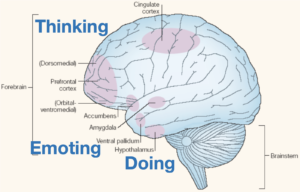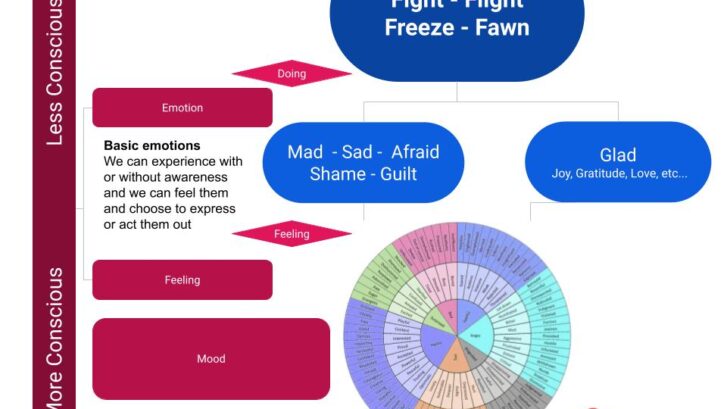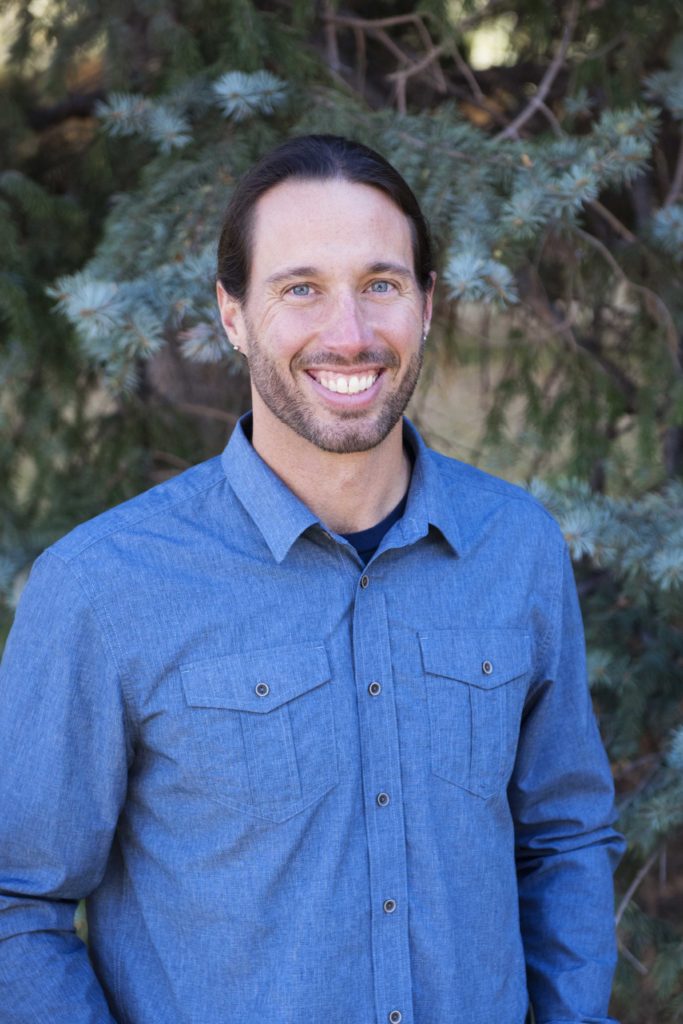Emotions and Feelings 101 (and maybe 102)
Emotions, feelings, moods, all the same thing. Right? Not at all. And understanding our feelings is so foundational to understanding ourselves and being able to heal in therapy I thought it would be helpful to put together this quick guide to share with clients to help you gain more understanding of your own human system. There’s much more detail to all of this, but hopefully, this guide will help get the gist of what is happening inside you.
Our brains have evolved over thousands of years. Some parts of our brains we share with reptiles, some with other mammals, and some are unique to humans alone. Generally speaking, the lower parts of our brain are the most basic and most similar to reptiles. As you move upward, your brain gets more sophisticated. The lower parts of our brains are designed to keep us alive. The upper parts help us connect with others, communicate, understand, and make meaning of life. These are the parts that make us different from other animals. But we also need to understand how the lower parts of our brain affect us too!

From: http://erikmessamore.com/what-is-emotion-regulation-and-how-do-we-do-it/
Emotionally speaking, the lower parts of our brain are responsible for instinctual survival functions in the face of a threat. These are all actions that usually happen without our consciousness involved because the impulsive instinctual brain is faster than our cognitive brain.
Fight – get stronger and attack the threat
Flight – get away from the threat
Freeze – don’t move, play dead, so hopefully, the threat will go away
Fawn – act pleasing, innocent, harmless, and endearing so the threat doesn’t see you as a threat to avoid the conflict
Where our lower brains are not so smart is that in modern-day, the threat isn’t usually a tiger or assailant but could be a look from someone, a social media post, a raised voice from a friend or family member, an insult, or any number of things that raise our hackles in big or small ways. Our brains sometimes respond in one of the above survival ways when our survival isn’t being threatened at all, especially if we have had past exposure to traumatic events.
These four survival emotions get a little more sophisticated as we move to the mid-brain and with a little more awareness, they get shaped into the basic emotions that all humans in all cultures experience. These emotions exist to help us relate to other people. Different researchers have categorized them differently, but I like to use the five basic emotions that mostly rhyme to help people remember them. MAD, SAD, AFRAD (afraid), GLAD, SHAME/GUILT. Shame and guilt feel similar, but are two different things. Shame means I’m bad (unhealthy), guilt means I did something bad (healthy) to help us have remorse and repair.
Notice most of these are what most people call “negative” feelings and only one is “positive.” I think we evolved like this for a reason, to help us avoid doing things that cause us or people we care about harm. But unfortunately, it leads to a negativity bias in our brains and a positivity bias in our external relationships trying to balance out the scales. In reality, we need all of these feelings so there is no such thing as a positive or negative feeling. They are all helpful information to help us understand our inner and external worlds.
If you can get a solid grasp of being able to feel and identify when you are feeling the 5 basic emotions, you have most of what you need to be an emotionally intelligent human being. Being able to communicate emotions with others helps us to relate and connect with others, to understand and be understood, and to be able to give and receive support. I consider this to be a foundational human skill. As our relationships get more complex and we get better at communicating, we have need for more precise emotional words, so psychologists have invented various versions of the emotion wheel to show how these basic emotions get more nuanced.
Some of these feelings can overlap, and we can feel multiple emotions at the same time. So don’t misunderstand the wheel to be the ultimate truth. See if you can find your own language for your own expression of your emotions.

From: https://practicalpie.com/the-emotion-wheel/
As you can see, our feelings can go from quite simplistic and primal survival to emotions of relating to quite complex and nuanced. That’s why it’s important to distinguish between emotions and feelings. Emotions can sometimes feel big and overwhelming. Almost as if the emotions have us more than we have them. Feeling overwhelmed by emotion often comes from little awareness and understanding of emotions and triggers for them. As we gain more awareness and skill, we can be a person having our emotions rather than our emotions having us. This increase in awareness and distance from the raw intensity of emotion combined with thoughts turns them into feelings. Feelings are very important information. They help us make decisions about what is right for us and what we need to stay away from and can lead us to conscious action and/or communication.
When we are consumed with emotion, we often don’t have access to critical thinking or discernment that is available when we are feeling. Sometimes we even act out of an emotion, such as yelling at someone (anger/fight) or distancing ourselves or avoiding something (fear/flight) or going numb (fear/freeze). This usually happens with little consciousness or choice. So we are acting out an emotion (doing) rather than feeling and communicating about a feeling which is usually more helpful.
The more consciousness we bring to ourselves, the more choice we have to understand and act appropriately. And we can often increase the time between the stimulus that causes the emotion and the response (impulsively or consciously) to act in a more appropriate way. Without awareness, we respond impulsively or emotionally, which might cause more harm than good.
Here’s a chart I made to visualize the process I’m talking about.

As you can see, doing, feeling, and thinking follows the evolution of the brain. Reptiles do without awareness or feeling. Mammals have the ability to feel and relate to others but may not have words and thoughts like humans. Humans have all of the above with the addition of complex language and cognitive abilities. One function isn’t necessarily better than another; we need them all. Thinking can help us make sense of and respond more effectively to our emotions and feelings. But when used to excess without connection to feeling or emotion or action, thinking can also disconnect us from ourselves, our life, and others. So thinking, too has to be used and responded to appropriately, just like emotions. We need doing, feeling, thinking, and being all accessible to us at the right time and place.
Further, overthinking and rumination often lead to a stuckness of emotion or feeling, which leads to moods. Moods are more generalized, pervasive emotional states that can last days, weeks, months, or even years. Emotions come and go, just like the weather. When we try not to feel them by suppressing or repressing them, they can get stuck and lead to moods. Unpacking moods, like being depressed, can take time to really understand all the inputs from both present and past experiences as well as the unnamed unexplored feelings that comprise the mood.
As I said, this is a quick overview of our emotional systems. There is some more information in the links above. There’s a bit more to it, and some of this is a broad generalization to help distinguish what is happening. Understanding these basics help tremendously to help you understand yourself and others. People often think that our thoughts control our feelings; and they do to some extent. But our survival instincts and the basic raw emotions that evolved out of them can be much more powerful than our thoughts. Just try to control your feelings with thoughts when you get dumped by a partner you really cared about, lose a job that you loved, get into a physical fight, or anything else that touches into our survival needs.
The way I see it, our thoughts and feelings and actions are all in relationship to each other, all equally valid, no one mode is more important than the other. The more you understand what is happening inside of you and outside of you and have awareness of what emotions and feelings are being experienced, the more you can engage your full self and your relationships to prevent things from spiraling out of control into overwhelm, unconscious action, or a stuck stagnant mood.
Chuck Hancock, M.Ed, LPC is a Licensed Professional Counselor in the state of CO. He has completed comprehensive training in the Hakomi Method of Experiential Psychotherapy, a mindfulness mind-body centered approach and is a student of depth psychology. Chuck guides individuals and groups in self-exploration providing them with insight and tools for change. He also incorporates nature as a therapy tool to help shift perspective and inspire new patterns.




